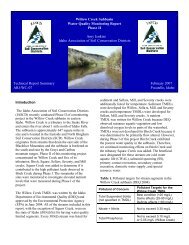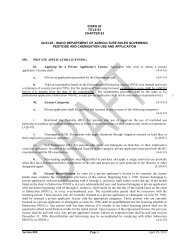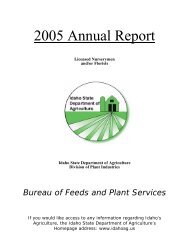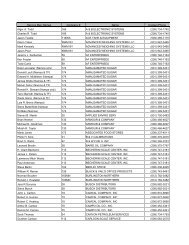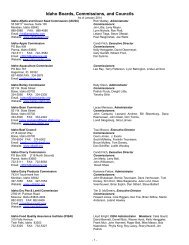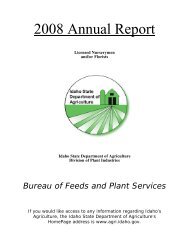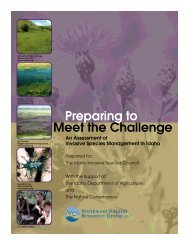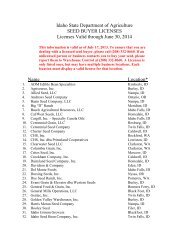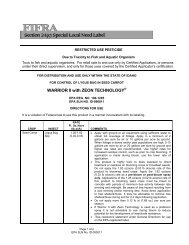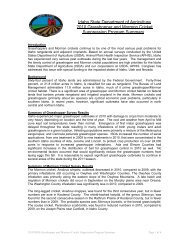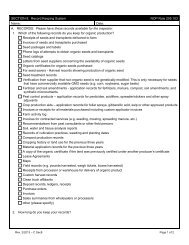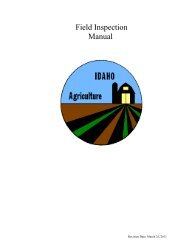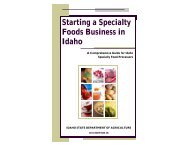Grants - Agriculture Focus - Idaho Department of Agriculture - Idaho ...
Grants - Agriculture Focus - Idaho Department of Agriculture - Idaho ...
Grants - Agriculture Focus - Idaho Department of Agriculture - Idaho ...
Create successful ePaper yourself
Turn your PDF publications into a flip-book with our unique Google optimized e-Paper software.
<strong>Grants</strong> - <strong>Agriculture</strong> <strong>Focus</strong><br />
<strong>Idaho</strong> State <strong>Department</strong> <strong>of</strong> <strong>Agriculture</strong><br />
Market Development Division<br />
(208) 332-8530<br />
www.agri.idaho.gov<br />
Table <strong>of</strong> Contents<br />
General Federal Grant/Funding Resources …………………………………………………. 3<br />
The Catalog <strong>of</strong> Federal Domestic Assistance<br />
USA.gov<br />
GovBenefits.gov<br />
Foundation Center<br />
Building Better Rural Places Catalogue<br />
<strong>Grants</strong>.gov<br />
Community Development ……..…………………………..…………………………….……. 5<br />
Community Food Projects Competitive <strong>Grants</strong> Program<br />
<strong>Grants</strong> for Rural Development, Forestry, and Communities<br />
Conservation & Resource Management …………………………………………….……….. 6<br />
Farm Service Agency<br />
Natural Resources Conservation Service<br />
<strong>Idaho</strong> Conservation Innovation Grant<br />
Financing Businesses and New Enterprises ………………………………………………….…… 8<br />
Small Business Development Center Program (SBDC)<br />
Quality Samples Program (QSP)<br />
Rural Business Enterprise <strong>Grants</strong> (RBEG)<br />
Rural Business Opportunity <strong>Grants</strong> (RBOG)<br />
Small Business Innovation Research Program (SBIR)<br />
Rural Cooperative Development Grant (RCDG) Program<br />
Small Minority Producer Grant<br />
Marketing & Development ………………………………………….………………..………….. 12<br />
Federal-State Marketing Improvement Program (FSMIP)<br />
Foreign Market Development Program (FMD)<br />
Emerging Markets Program (EMP)<br />
Market Access Program (MAP)<br />
Western U.S. Agricultural Trade Association (WUSATA)<br />
Market Development Cooperator Program (MDCP)<br />
Value-Added Agricultural Product Market Development <strong>Grants</strong> (VAPG)<br />
Forest Products Lab: Technology Marketing Unit (TMU)<br />
Farmers Market Promotion Program (FMPP)<br />
Specialty Crop Block Grant Program (SCBGP)<br />
Research …………………………………………………………………………………..…… 17<br />
Sustainable <strong>Agriculture</strong> Research and Education (SARE) Program<br />
Pest Management Alternatives Program (PMAP)<br />
Pesticide Environmental Stewardship Program (PESP)<br />
Special Research <strong>Grants</strong> Program- Potato Research<br />
1
Biomass Research and Development Initiative<br />
Specialty Crop Research Initiative (SCRI)<br />
Specialty Crop Block Grant Program (SCBGP)<br />
Technical Assistance …………………………….…………………………………………..…….. 20<br />
Technical Assistance for Specialty Crops (TASC)<br />
Technical Issues Resolution Fund (TIRF)<br />
Quick Response Marketing Fund (QRMF)<br />
The Cochran Fellowship Program<br />
Pr<strong>of</strong>essional Development Program<br />
Research and Scientific Exchanges Division (RSED)<br />
Community Outreach and Assistance Partnership Program<br />
Technical Assistance to Cooperatives<br />
2
General<br />
Federal Grant/Funding Programs<br />
The Catalog <strong>of</strong> Federal Domestic Assistance<br />
This website gives access to a database <strong>of</strong> all Federal assistance programs.<br />
Assistance programs are available for:<br />
State and local governments<br />
Federally-recognized Indian tribal governments<br />
Territories (and possessions) <strong>of</strong> the United States<br />
Domestic public, quasi-public, and private pr<strong>of</strong>it and nonpr<strong>of</strong>it organizations and<br />
institutions<br />
Specialized groups<br />
Individuals<br />
Under “Find Assistance Programs,” the database is searchable by agency, functional area,<br />
deadline dates, eligibility, beneficiary, and type <strong>of</strong> assistance and by keyword.<br />
The website also provides:<br />
Name <strong>of</strong> program, agency, purpose <strong>of</strong> grant, application process and link to application,<br />
contact information, and sample grants awarded in the past<br />
Several aids for writing grant proposals.<br />
Website: www.cfda.gov<br />
USA.gov<br />
This website provides a comprehensive listing <strong>of</strong> all types <strong>of</strong> information, services and resources.<br />
This website is the <strong>of</strong>ficial U.S. gateway to all government information. Sources include federal<br />
and state governments, U.S. territories and foreign nations. Gateway searches more than 51<br />
million web pages.<br />
GovBenefits.gov<br />
This website provides a personalized screening tool for individual assistance.<br />
The online screening tool is free, easy-to-use, and confidential as it does not require a name,<br />
phone number, Social Security number, or any other information that could be used for<br />
identification.<br />
<br />
<br />
“Home” section (at below link): Answer a series <strong>of</strong> questions about yourself<br />
GovBenefits.gov returns a list <strong>of</strong> government benefit programs you may be eligible to<br />
receive along with information about how you can apply.<br />
3
The following link lists agencies and organizations that provide benefits programs:<br />
www.govbenefits.gov<br />
Foundation Center<br />
The Foundation Center provides information on private philanthropy in the United States. They<br />
help grantseekers, grantmakers, researchers, policymakers, the media, and the general public<br />
better understand the field <strong>of</strong> philanthropy.<br />
Website: http://foundationcenter.org/getstarted/newvisitors/<br />
Building Better Rural Places Catalogue<br />
A USDA publication and website focusing on federal programs for sustainable agriculture,<br />
forestry, conservation and community development.<br />
USDA agencies and programs providing major support for this publication:<br />
Resource Conservation and Development<br />
Natural Resources Conservation Service<br />
U.S. Forest Service<br />
Cooperative State Research, Education & Extension Service<br />
Sustainable <strong>Agriculture</strong> Research and Education Program (SARE)<br />
Website: http://attra.ncat.org/guide/<br />
<strong>Grants</strong>.gov<br />
<strong>Grants</strong>.gov is your source to FIND and APPLY for federal government grants. The U.S.<br />
<strong>Department</strong> <strong>of</strong> Health and Human Services is proud to be the managing partner for <strong>Grants</strong>.gov,<br />
an initiative that is having an unparalleled impact on the grant community. This website was<br />
established as a governmental resource named the E-<strong>Grants</strong> Initiative, part <strong>of</strong> the President's<br />
2002 Fiscal Year Management Agenda to improve government services to the public.<br />
<strong>Grants</strong>.gov is a central storehouse for information on over 1,000 grant programs and provides<br />
access to approximately $500 billion in annual awards. Many other grants listed in this<br />
document can be found on grants.gov. The application process for many grants is also processed<br />
through grants.gov. This is a very important website to become familiar with.<br />
4
Community Development<br />
Community Food Projects Competitive <strong>Grants</strong> Program<br />
The Community Food Projects Competitive Grant Program (CFPCGP) has existed since 1996 as<br />
a program to fight food insecurity through developing community food projects that help<br />
promote the self-sufficiency <strong>of</strong> low-income communities. Community Food Projects are<br />
designed to increase food security in communities by bringing the whole food system together to<br />
assess strengths, establish linkages, and create systems that improve the self-reliance <strong>of</strong><br />
community members over their food needs.<br />
National Program Office<br />
USDA-CSREES, Stop 2241<br />
Washington, DC 20250-2241<br />
Tel: (202) 720-8188<br />
E-mail: comfood@csrees.usda.gov<br />
www.csrees.usda.gov/nea/food/in_focus/hunger_if_competitive.html<br />
<strong>Grants</strong> for Rural Development, Forestry, and Communities<br />
Funded jointly by the USDA and the Forest Service, this grant is to help rural areas analyze and<br />
assess forest resource opportunities, maximize local economic potential through market<br />
development and expansion, and diversify communities' economic base.<br />
Funding may be allocated for such things as technical assistance, training and education,<br />
equipment, marketing, and all costs associated with making these services available to tribal<br />
nations, State and Federal agencies, State Foresters, local governments, not-for-pr<strong>of</strong>it<br />
organizations, and others who are extending services to rural communities.<br />
Intermountain Region Northern Region<br />
Jack Troyer<br />
Federal Building<br />
324 25th Street200 East Broadway<br />
Ogden, Utah 84401 P.O. Box 7669<br />
Tel: (801) 625-5306 Missoula, MT 59807<br />
Tel: (406) 329-3315<br />
Website:<br />
www.cfda.gov/index?s=program&mode=form&tab=step1&id=75bcb54aa364fa4bd6035f464419<br />
1e81<br />
5
Conservation & Resource Management<br />
Farm Service Agency<br />
The Farm Service Agency (FSA) administers and manages farm commodity, credit,<br />
conservation, disaster, and loan programs as laid out by Congress through a network <strong>of</strong> federal,<br />
state and county <strong>of</strong>fices. These programs are designed to improve the economic stability <strong>of</strong> the<br />
agricultural industry and to help farmers adjust production to meet demand. Economically, the<br />
desired result <strong>of</strong> these programs is a steady price range for agricultural commodities for both<br />
farmers and consumers. Programs vary from year to year, so contact your local <strong>of</strong>fice to find out<br />
what programs are currently active.<br />
Boise Office<br />
9173 West Barnes Drive<br />
Boise, ID 83709-1573<br />
Tel: (208) 378-5650<br />
Fax: (208) 378-5678<br />
www.fsa.usda.gov<br />
Natural Resources Conservation Service<br />
Provides leadership in a partnership effort to help people conserve, maintain, and improve our<br />
natural resources and environment<br />
The conservation provisions in the Food, Conservation, and Energy Act <strong>of</strong> 2008 (2008 Farm<br />
Bill) will provide conservation opportunities for farmers and ranchers for years to come. The<br />
new provisions build on the conservation gains made by farmers and ranchers through the 1985,<br />
1996 and 2002 Farm Bills. They simplify existing programs and create new programs to address<br />
high priority environmental goals.<br />
NRCS's natural resources conservation programs help people reduce soil erosion, enhance water<br />
supplies, improve water quality, increase wildlife habitat, and reduce damages caused by floods<br />
and other natural disasters. Public benefits include enhanced natural resources that help sustain<br />
agricultural productivity and environmental quality while supporting continued economic<br />
development, recreation, and scenic beauty.<br />
Conservation programs under the 2008 Farm Bill are:<br />
Agricultural Management Assistance Program (AMA)<br />
Chesapeake Bay Watershed Initiative (CBWI)<br />
Cooperative Conservation Partnership Initiative (CCPI)<br />
Conservation <strong>of</strong> Private Grazing Land Program<br />
Conservation Reserve Program (Farm Service Agency)<br />
Conservation Stewardship Program (CSP)<br />
Environmental Quality Incentives Program (EQIP)<br />
Agricultural Water Enhancement Program (EQIP)<br />
Conservation Innovation <strong>Grants</strong> (EQIP)<br />
Farm and Ranch Lands Protection Program (FRPP)<br />
6
Grassland Reserve Program (GRP)<br />
Healthy Forest Reserve Program (HFRP)<br />
Small Watershed Rehabilitation Program<br />
Wetlands Reserve Program (WRP)<br />
Wildlife Habitat Incentive Program (WHIP)<br />
For more information go to:<br />
www.nrcs.usda.gov/programs/farmbill/2008/index.html<br />
<strong>Idaho</strong> Conservation Innovation Grant<br />
The purpose <strong>of</strong> CIG is to stimulate the development and adoption <strong>of</strong> innovative conservation<br />
approaches and technologies while leveraging Federal investment in environmental<br />
enhancement and protection, in conjunction with agricultural production.<br />
CIG projects are expected to lead to the transfer <strong>of</strong> conservation technologies, management<br />
systems, and innovative approaches (such as market-based systems) into NRCS technical<br />
manuals or guides, or to the private sector. The three natural resource concerns for possible<br />
funding through Conservation Innovation <strong>Grants</strong> for fiscal year 2007 are: Water Resources; Soil<br />
Resources; and Atmospheric Resources. Market Based Approaches to address any or all <strong>of</strong> these<br />
three resource concern areas will be considered.<br />
Eugene Schock<br />
Assistant State Conservationist for Technical Service<br />
Tel: (208) 378-5720<br />
Email: eugene.schock@id.usda.gov<br />
www.id.nrcs.usda.gov/programs/cig/index.html<br />
7
Financing Businesses and New Enterprises<br />
Small Business Development Center Program (SBDC)<br />
To provide management assistance to current and prospective small business owners.<br />
The SBDC Program is designed to deliver up-to-date counseling, training and technical<br />
assistance in all aspects <strong>of</strong> small business management. SBDC services include, but are not<br />
limited to, assisting small businesses with financial, marketing, production, organization,<br />
engineering and technical problems and feasibility studies. Special SBDC programs and<br />
economic development activities include international trade assistance, technical assistance,<br />
procurement assistance, venture capital formation and rural development.<br />
James Hogge, State Director<br />
1910 University Drive<br />
Boise, ID 83725-1655<br />
Office: 1021 Manitou Ave.<br />
Tel: 208-426-3799<br />
Fax: 208-426-3877<br />
Email: info@isbdc.org<br />
Website: www.idahosbdc.org<br />
Quality Samples Program (QSP)<br />
Assists U.S. agricultural trade organizations provide small samples <strong>of</strong> their agricultural<br />
products to potential importers in emerging markets overseas.<br />
Program Information:<br />
<strong>Focus</strong>ing on industry and manufacturing, as opposed to end-use consumers, QSP permits<br />
potential customers to discover U.S. quality. It also allows manufacturers overseas to do test runs<br />
to assess how U.S. food and fiber products can best meet their production needs. In 2009, USDA<br />
provided allocations totaling $2.027 million to trade associations and state agricultural<br />
organizations under this program.<br />
Trade organizations and private firms can submit QSP proposals to USDA as part <strong>of</strong> the Unified<br />
Export Strategy (UES). Participants who are approved for QSP funding obtain commodity<br />
samples, export them and provide the importer the technical assistance necessary to use the<br />
sample properly. When a project is finished, USDA reimburses the participants for the costs <strong>of</strong><br />
procuring and exporting the samples. The technical assistance component is not covered by the<br />
program.<br />
USDA-FAS <strong>Grants</strong> Management Branch<br />
Phone: (202) 720-6896<br />
Fax: (202) 690-0193<br />
E-mail: john.D.brewer@fas.usda.gov<br />
www.fas.usda.gov/mos/programs/QSP.asp<br />
8
Rural Business Enterprise <strong>Grants</strong> (RBEG)<br />
<strong>Grants</strong> for Assisting Small and Emerging Rural Businesses to Nonpr<strong>of</strong>its and Public Bodies<br />
Finance and facilitate the development <strong>of</strong> small and emerging private business enterprises<br />
located in rural areas through grants to public bodies, nonpr<strong>of</strong>its, and federally recognized Indian<br />
Tribal groups.<br />
<br />
This includes starting and operating revolving loan funds, business incubators, and industrial<br />
parks. In addition, costs that may be paid from grant funds include the acquisition and<br />
development <strong>of</strong> land and the construction <strong>of</strong> buildings, plants, equipment, access streets and<br />
roads, parking areas, and utility and service extensions; refinancing; fees for pr<strong>of</strong>essional<br />
services; technical assistance and training associated with technical assistance; startup operating<br />
costs and working capital, providing financial assistance to a third party; production <strong>of</strong> television<br />
programs to provide information to rural residents; and creating, expanding, and operating rural<br />
distance learning networks.<br />
State Office<br />
National Program Office<br />
9173 West Barnes, Ste A1 USDA, Rural Business-Cooperative Service<br />
Boise, ID 83709 Room 6868 South Building, Stop 3225<br />
Tel: (208) 378-5600 Washington, D.C. 20250<br />
Website: www.rurdev.usda.gov/id/ Tel: (202) 720-1400<br />
www.rurdev.usda.gov/rbs/busp/rbeg.htm<br />
Rural Business Opportunity <strong>Grants</strong> (RBOG)<br />
<strong>Grants</strong> to nonpr<strong>of</strong>its and public bodies for community planning, technical assistance and<br />
training for rural businesses.<br />
The Rural Business Opportunity <strong>Grants</strong> program (RBOG) was created by the 1996 Farm Bill to<br />
assist in the economic development <strong>of</strong> rural areas by providing grants to assist business and<br />
community development. Grant funds may be used to:<br />
Identify and analyze business opportunities, including export markets, that will use<br />
local natural and human resources;<br />
Identify, train, and provide technical assistance to existing or prospective rural<br />
entrepreneurs and managers;<br />
Establish business support centers and otherwise assist in the creation <strong>of</strong> new rural<br />
businesses;<br />
<br />
<br />
<br />
<br />
Conduct local community or multi-county economic development planning;<br />
Establish centers for training, technology, and trade that will provide training to rural<br />
businesses in the utilization <strong>of</strong> interactive communications technologies to develop<br />
international trade opportunities and markets;<br />
Conduct leadership development training <strong>of</strong> existing or prospective rural<br />
entrepreneurs and managers; and<br />
Pay reasonable fees and charges for pr<strong>of</strong>essional services necessary to conduct the<br />
technical assistance, training or planning functions.<br />
9
National Program Office<br />
Rural Business-Cooperative Service, Specialty Lenders Division<br />
1400 Independence Ave, SW, Stop 3225<br />
Washington, D.C. 20250-1521<br />
Tel: (202) 720-6819<br />
Fax: (202) 720-2213<br />
Website: www.rurdev.usda.gov/rbs/coops/rbog.htm<br />
Small Business Innovation Research Program (SBIR)<br />
<strong>Grants</strong> for feasibility studies and product research and development to small businesses.<br />
Ten federal agencies grant SBIR funds. The USDA's SBIR program makes grants that are<br />
competitively awarded for feasibility studies and product research and development to qualified<br />
small businesses. SBIR funds support high quality research proposals containing advanced<br />
concepts related to important scientific problems and opportunities in agriculture that could lead<br />
to significant public benefit if the research is successful.<br />
Objectives: To stimulate technological innovations in the private sector, strengthen the role <strong>of</strong><br />
small businesses in meeting Federal research and development needs, increase private sector<br />
commercialization <strong>of</strong> innovations derived from USDA-supported research and development<br />
efforts, and foster and encourage participation by women-owned and socially and economically<br />
disadvantaged small business firms in technological innovations.<br />
Research categories: Forests and Related Resources; Plant Production and Protection; Animal<br />
Production and Protection; Air, Water and Soils; Food Science and Nutrition; Rural and<br />
Community Development; Aquaculture; Industrial Applications; and Marketing and Trade.<br />
The SBIR grant program is divided into two phases.<br />
Phase I grants support technical feasibility studies.<br />
Phase II grants provide financial assistance for Phase I projects to enter the development<br />
stage to the point <strong>of</strong> commercialization.<br />
Businesses are encouraged to pursue Phase III—commercialization—through other<br />
sources, as SBIR does not provide funding for expansion, marketing, and application <strong>of</strong><br />
the developed technology.<br />
National Program Office<br />
Charles Cleland, Director SBIR Program<br />
Cooperative State Research, Education, and Extension Service, USDA,<br />
Tel: (202) 401-6852<br />
Email: ccleland@csree.usda.gov<br />
Website: www.sbir.gov<br />
State Contact<br />
Rick Ritter<br />
SBIR Boise Office<br />
10
Tel: (208) 426-3870<br />
Email: rritter@boisestate.edu<br />
Website: www.sbir.gov/state/id.htm<br />
Rural Cooperative Development Grant (RCDG) Program<br />
Rural Cooperative Development grants are made for establishing and operating centers for<br />
cooperative development for the primary purpose <strong>of</strong> improving the economic condition <strong>of</strong> rural<br />
areas through the development <strong>of</strong> new cooperatives and improving operations <strong>of</strong> existing<br />
cooperatives.<br />
Appropriations total $3.5 million for fiscal year 2007. Max award per grant is $200,000, and<br />
matching funds are required. <strong>Grants</strong> may be made to nonpr<strong>of</strong>it corporations and institutions <strong>of</strong><br />
higher education, but not to public bodies. For more information you can go directly to the<br />
website at www.rurdev.usda.gov/rbs/coops/rcdg/rcdg.htm or contact the local <strong>of</strong>fice.<br />
USDA Rural Development State Office<br />
9713 West Barnes Drive, Suite A1<br />
Boise, ID 83709<br />
Tel: 1 (800) 632-5991 (toll free) or (208) 378-5600<br />
Fax: (208) 378-564<br />
Website: www.rurdev.usda.gov/id<br />
Small Minority Producer Grant<br />
Provides funds for cooperatives or associations <strong>of</strong> cooperatives whose primary focus is to<br />
provide assistance to small minority producers and whose governing board and/or membership<br />
is comprised <strong>of</strong> at least 75 percent minority members.<br />
Diane Berger<br />
Loan Specialist<br />
Mail Stop 3250<br />
Tel: (202) 690-1508<br />
Website: www.rurdev.usda.gov/rbs/coops/smpg.htm<br />
11
Marketing & Development<br />
Federal-State Marketing Improvement Program (FSMIP)<br />
Matching <strong>Grants</strong> for Marketing Agricultural Products through State <strong>Department</strong>s <strong>of</strong> <strong>Agriculture</strong><br />
FSMIP funds can be requested for a wide range <strong>of</strong> marketing projects, including, but not limited<br />
to, the following:<br />
Developing and testing new or more efficient methods <strong>of</strong> processing, packaging,<br />
handling, storing, transporting, and distributing food and other agricultural products.<br />
Assessing customer response to new or alternative agricultural products or marketing<br />
services, and evaluating potential marketing opportunities for U.S. producers,<br />
processors, and agribusinesses, in domestic and international markets.<br />
Identifying problems and barriers in existing channels <strong>of</strong> trade and exploring<br />
improvements to marketing practices, facilities, or systems to address such problems.<br />
National Program Office<br />
Janise Zygmont, Staff Officer<br />
Federal-State Marketing Improvement Program<br />
Agricultural Marketing Service, USDA<br />
Telephone: (202) 720-5024<br />
E-mail: janise.zygmont@usda.gov or fsmip@usda.gov<br />
Website: www.ams.usda.gov/fsmip<br />
State Program Office<br />
Laura Johnson, Section Manager<br />
<strong>Idaho</strong> State <strong>Department</strong> <strong>of</strong> <strong>Agriculture</strong><br />
Tel: (208) 332-8533<br />
Email: laura.johnson@agri.idaho.gov<br />
Website: www.agri.idaho.gov<br />
Foreign Market Development Program (FMD)<br />
Aids U.S. farmers, processors, and exporters in the creation, expansion, and maintenance <strong>of</strong><br />
long-term export markets for U.S. agricultural products.<br />
The overseas promotions focus on generic U.S. commodities (rather than individual brand-name<br />
products) and are targeted toward long-term development. A Cooperator program which enlists<br />
private sector involvement and resources in coordinated efforts to promote U.S. products to<br />
foreign importers and consumers around the world. In 2002, Cooperators and U.S. industry<br />
resource contributions totaled 121 percent <strong>of</strong> the funds provided by FAS. Preference is given to<br />
nonpr<strong>of</strong>it U.S. agricultural and trade groups that represent an entire industry or are nationwide in<br />
membership and scope.<br />
USDA-FAS Marketing Operations Staff<br />
Tel: (202) 720-4327<br />
Website: www.fas.usda.gov/mos/programs/fmdprogram.asp<br />
12
Emerging Markets Program (EMP)<br />
To improve market access by developing, maintaining, or enhancing the exports <strong>of</strong> U.S.<br />
agricultural commodities and products to low- and middle-income countries which have or are<br />
developing market-oriented economies, and which can be viable markets for these U.S. products.<br />
The program funds technical assistance activities: Example are feasibility studies, market<br />
research, sector assessments, orientation visits, specialized training, business workshops, etc.<br />
The EMP is a generic program, not a branded program. It generally works with national<br />
cooperators although technical assistance can be targeted toward specific issues for particular<br />
commodities.<br />
<strong>Grants</strong> Management Branch<br />
Foreign Agricultural Service<br />
Tel: (202) 720-0866<br />
Email: podadmin@fas.usda.gov<br />
Website: www.fas.usda.gov/mos/em-markets/em-markets.asp<br />
Market Access Program (MAP)<br />
To create, maintain and expand long-term export markets for U.S. agricultural products through<br />
cost-share assistance and the opportunity to work closely with FAS and its overseas <strong>of</strong>fices for<br />
Export Market Development Activities such as Consumer Promotions, Market Research,<br />
Technical Assistance and Trade Servicing<br />
The Market Access Program (MAP), formerly the Market Promotion Program, uses funds from<br />
the U.S. <strong>Department</strong> <strong>of</strong> <strong>Agriculture</strong>'s (USDA) Commodity Credit Corporation (CCC) to help<br />
U.S. producers, exporters, private companies, and other trade organizations finance promotional<br />
activities for U.S. agricultural products. The MAP encourages the development, maintenance,<br />
and expansion <strong>of</strong> commercial export markets for agricultural commodities. Activities financed<br />
include consumer promotions, market research, technical assistance, and trade servicing.<br />
Funds are authorized through program agreements with nonpr<strong>of</strong>it U.S. trade associations called<br />
Cooperators. To find out more contact:<br />
The Office <strong>of</strong> Trade Programs<br />
Tel: (202)720-4327<br />
website http://www.fas.usda.gov/mos/programs/map.asp<br />
Western U.S. Agricultural Trade Association<br />
WUSATA's Generic Program sponsors industry-wide food and agricultural projects that are<br />
jointly managed by state marketing specialists and WUSATA. The projects or activities<br />
sponsored by the Generic Program include everything from reverse buying missions and in-store<br />
demonstrations, to trade shows, and market research.<br />
13
WUSATA’s Branded Program is a cost-share program that provides 50% reimbursement <strong>of</strong><br />
pre-approved international marketing expenses to small, food and non-food agricultural<br />
companies. To be eligible, the company must be classified as small and have a product that is <strong>of</strong><br />
at least 50% U.S. agricultural origin and is labeled as a product <strong>of</strong> the U.S.A.<br />
Western U.S. Agricultural Trade Association (WUSATA)<br />
4601 NE 77th Ave., Suite 120<br />
Vancouver, Washington, USA 98662<br />
Tel: 360-693-3373<br />
Website: www.wusata.org<br />
Market Development Cooperator Program (MDCP)<br />
A competitive matching grants program which helps to underwrite the start up costs <strong>of</strong> new<br />
export marketing ventures for groups that are particularly effective in reaching small- and<br />
medium-size enterprises (SMEs).<br />
The program is administered through the International Trade Administration. Generally, private<br />
enterprises are not eligible. The following are usually found to be eligible:<br />
Trade associations<br />
State departments <strong>of</strong> trade<br />
Regional associations <strong>of</strong> trade and economic development<br />
World Trade Centers<br />
Chambers <strong>of</strong> commerce<br />
Small business development centers<br />
Non-pr<strong>of</strong>it industry organizations<br />
<strong>Idaho</strong> Office<br />
Amy Benson, USEAC Director<br />
700 West State Street, 2nd Floor<br />
Boise, ID 83720<br />
Tel:(208)364-7791<br />
Email: Amy.Benson@mail.doc.gov<br />
Website: www.ita.doc.gov/td/mdcp/<br />
Value-Added Agricultural Product Market Development <strong>Grants</strong> (VAPG)<br />
Also known as the Value Added Producers Grant (VAPG), this grant is to help producers <strong>of</strong><br />
agricultural commodities, agricultural producer groups, farmer and rancher cooperatives and<br />
majority owned producer based business ventures develop business plans for viable marketing<br />
opportunities and develop new strategies to create marketing opportunities in emerging markets<br />
<strong>Idaho</strong> Office<br />
9173 W Barnes Dr. Suite A1<br />
Boise, ID 83709-1574<br />
Tel: 208-378-5603<br />
Website: www.rurdev.usda.gov/rbs/coops/vadg.htm<br />
14
Forest Products Lab: Technology Marketing Unit (TMU)<br />
The program is designed to assist in turning small diameter and underutilized wood species into<br />
marketable forest products, including biomass energy.<br />
The public goal is to reduce the cost per acre <strong>of</strong> hazardous fuel treated needed to protect<br />
communities from wildland fire and improve the overall health <strong>of</strong> the nations forest. Program<br />
may include: (1) development <strong>of</strong> potential new products; (2) projects that showcase innovative<br />
uses for small diameter and low-valued hardwoods and s<strong>of</strong>twoods; and (3) reducing the<br />
challenge to economic and market barriers to the use <strong>of</strong> the material (4) provide seed money and<br />
gap funding (5) facilitating creation/expansion <strong>of</strong> harvesting/processing/transporting enterprises<br />
around wildland urban interface areas.<br />
Technology Marketing Unit, State and Private Forestry<br />
Forest Service, Forest Products Laboratory<br />
One Gifford Pinchot Dr.<br />
Madison, WI 53726-2398<br />
Tel: (608) 231-9504.<br />
Website: www.fpl.fs.fed.us/tmu<br />
Farmers Market Promotion Program (FMPP)<br />
The Farmers Market Promotion Program (FMPP) was created through a recent amendment <strong>of</strong><br />
the Farmer-to-Consumer Direct Marketing Act <strong>of</strong> 1976. The grants, authorized by the FMPP, are<br />
targeted to help improve and expand domestic farmers markets, roadside stands, communitysupported<br />
agriculture programs, agri-tourism activities, and other direct producer-to-consumer<br />
market opportunities. Approximately $10 million is allocated for FMPP for Fiscal Years 2011<br />
and 2012. The maximum amount awarded for any one proposal cannot exceed $100,000. Entities<br />
eligible to apply include agricultural cooperatives, producer networks, producer associations,<br />
local governments, nonpr<strong>of</strong>it corporations, public health corporations, economic development<br />
corporations, regional farmers market authorities and Tribal governments.<br />
Carmen Humphrey, Team Leader<br />
Marketing Services Branch<br />
Transportation and Marketing Programs, AMS, USDA<br />
Tel: (202)720-0933<br />
Email: USDAFMPP@usda.gov<br />
Website: www.ams.usda.gov/fmpp/<br />
Specialty Crop Block <strong>Grants</strong><br />
The United States <strong>Department</strong> <strong>of</strong> <strong>Agriculture</strong> allocates Specialty Crop Block Grant funding to<br />
the state and the <strong>Idaho</strong> State <strong>Department</strong> <strong>of</strong> <strong>Agriculture</strong> passes the funds through to the specialty<br />
crop industry as competitive grants.<br />
Projects must solely enhance the competitiveness <strong>of</strong> U.S. grown specialty crops in either<br />
domestic or foreign markets and must provide a benefit to more than just the applicant.<br />
15
Specialty crops include fruits and vegetables, tree nuts, dried fruits, and horticulture and nursery<br />
crops, including floriculture.<br />
Funds are available to interested local, state, and federal government, non-pr<strong>of</strong>it and for-pr<strong>of</strong>it<br />
organizations, and universities. Projects may include, but are not limited too, pest and disease<br />
control, enhancing food safety, developing new and improved seed varieties, increasing child<br />
and adult nutrition knowledge and consumption <strong>of</strong> specialty crops, market development, or<br />
developing good agricultural, handling, or manufacturing practices. Projects are evaluated on<br />
how well they enhance the competitiveness <strong>of</strong> <strong>Idaho</strong>’s specialty crops, soundness and quality <strong>of</strong><br />
the project plan, measurable outcomes and return on investment.<br />
<strong>Idaho</strong> State <strong>Department</strong> <strong>of</strong> <strong>Agriculture</strong>, Market Development Division<br />
Lacey Menasco<br />
2270 Old Penitentiary Rd<br />
Boise, ID 38712<br />
Tel: (208)332-8530<br />
Email: lacey.menasco@agri.idaho.gov<br />
Website: www.agri.idaho.gov/Categories/Marketing/specialitycropgrantphp.php<br />
16
Research<br />
Sustainable <strong>Agriculture</strong> Research and Education (SARE) Program<br />
<strong>Grants</strong> to Improve the Environmental and Economic Sustainability <strong>of</strong> Farming and Ranching to<br />
Educational Institutions, Nonpr<strong>of</strong>its and Producer.<br />
Proposal guidelines for each <strong>of</strong> the grants programs are available from the regional SARE <strong>of</strong>fices<br />
or the national program <strong>of</strong>fice. Each region solicits proposals and awards grants independently;<br />
contact the regional <strong>of</strong>fice for applications and deadlines.<br />
Western Region<br />
National Program Office<br />
Utah State University<br />
Jill S. Auburn, SARE Director<br />
<strong>Agriculture</strong> Programs<br />
1400 Independence Ave. SW<br />
Ag Science Bldg., Rm. 305 USDA Mail Stop 2223<br />
4865 Old Main Hill Road Washington, DC 20250-2223<br />
Logan, UT 84322-3944 Tel: (202) 720-5384<br />
Tel: (435) 797-2257 Fax: (202) 720-6071<br />
Website: http://wsare.usu.edu/<br />
Website: www.sare.org/<br />
Pest Management Alternatives Program (PMAP)<br />
Competitive <strong>Grants</strong> Supporting the Development and Implementation <strong>of</strong> Pest Management<br />
Alternatives When Regulatory Action by EPA or Voluntary Cancellation by the Registrant<br />
Results in the Unavailability <strong>of</strong> Certain Agricultural Pesticides or Pesticide Uses<br />
The purpose <strong>of</strong> Pest Management Alternatives Program (PMAP) is to provide support for the<br />
development and implementation <strong>of</strong> integrated pest management (IPM) practices, tactics, and<br />
systems for specific pest problems while reducing human and environmental risks. Applications<br />
may be submitted by State agricultural experiment stations, all colleges and universities, other<br />
research institutions and organizations, Federal agencies, private organizations or corporations,<br />
and individuals.<br />
National Program Office<br />
Monte Johnson<br />
National Program Leader for Environmental Toxicology<br />
Plant and Animal Systems, United States <strong>Department</strong> <strong>of</strong> <strong>Agriculture</strong><br />
Cooperative State Research, Education, and Extension Service<br />
Tel: (202) 401 - 1108<br />
Email: webcomments@nifa.usda.gov<br />
Website: http://www.csrees.usda.gov/fo/pestmanagementalternatives.cfm<br />
Pesticide Environmental Stewardship Program (PESP)<br />
<strong>Grants</strong> to be matched by States for Projects Aimed at Reducing the Risks and Uses <strong>of</strong> Pesticides<br />
in Agricultural and Non-Agricultural Settings<br />
17
Established in 1994, the Pesticide Environmental Stewardship Program (PESP) is an EPA<br />
partnership program that works with the nation's pesticide-user community to promote Integrated<br />
Pest Management (IPM) practices.<br />
Thomas Brennan<br />
US EPA<br />
Pesticide Environmental Stewardship Program<br />
Tel: 800-972-7717<br />
Email: pesp.info@epa.gov<br />
Website: http://www.epa.gov/pesp/pesp/index.html<br />
Special Research <strong>Grants</strong> Program- Potato Research<br />
<strong>Grants</strong> for State agricultural experiment stations, land-grant colleges and universities, research<br />
foundations established by land-grant colleges and universities, and some other<br />
college/university research institutions.<br />
Supports potato research that focuses on varietal development/testing and whose output will be<br />
or include potato varieties.<br />
James Parochetti<br />
National Program Leader<br />
United States <strong>Department</strong> <strong>of</strong> <strong>Agriculture</strong><br />
Cooperative State Research, Education, and Extension Service<br />
Tel: (202) 401 - 4354<br />
Email: jparochetti@nifa.usda.gov<br />
Website: www.csrees.usda.gov/fo/fundview.cfm?fonum=1124<br />
Biomass Research and Development Initiative<br />
To promote greater innovation and development related to biomass.<br />
Apply for financial assistance to address research and development <strong>of</strong> biomass based products,<br />
bioenergy, bi<strong>of</strong>uels and related processes. DOE and USDA have separate funding allocations<br />
and make separate awards under this heading.<br />
Carmela Bailey<br />
National Program Leader<br />
Division <strong>of</strong> Bioenergy<br />
Tel: 202-401-6443<br />
Email: webcomments@nifa.usda.gov<br />
Website: www.csrees.usda.gov/fo/biomassresearchanddevelopmentinitiative.cfm<br />
18
Specialty Crop Research Initiative (SCRI)<br />
The Specialty Crop Research Initiative (SCRI) was established to solve critical industry issues<br />
through research and extension activities. SCRI will give priority to projects that are multistate,<br />
multi-institutional, or trans-disciplinary; and include explicit mechanisms to communicate results<br />
to producers and the public. Projects must address at least one <strong>of</strong> five focus areas: research in<br />
plant breeding, genetics, and genomics to improve crop characteristics; efforts to identify and<br />
address threats from pests and diseases, including threats to specialty crop pollinators; efforts to<br />
improve production efficiency, productivity, and pr<strong>of</strong>itability over the long term; new<br />
innovations and technology, including improved mechanization and technologies that delay or<br />
inhibit ripening; and methods to prevent, detect, monitor, control, and respond to potential food<br />
safety hazards in the production and processing <strong>of</strong> specialty crops.<br />
National Institute <strong>of</strong> Food and <strong>Agriculture</strong><br />
Division <strong>of</strong> Plant Systems-Production<br />
Thomas Tom Bewick<br />
National Program Leader<br />
Tel: (202) 401 - 3356<br />
Email: tbewick@nifa.usda.gov<br />
Website: http://www.csrees.usda.gov/fo/specialtycropresearchinitiative.cfm<br />
Specialty Crop Block <strong>Grants</strong><br />
The United States <strong>Department</strong> <strong>of</strong> <strong>Agriculture</strong> allocates Specialty Crop Block Grant funding to<br />
the state and the <strong>Idaho</strong> State <strong>Department</strong> <strong>of</strong> <strong>Agriculture</strong> passes the funds through to the specialty<br />
crop industry as competitive grants.<br />
Projects must solely enhance the competitiveness <strong>of</strong> U.S. grown specialty crops in either<br />
domestic or foreign markets and must provide a benefit to more than just the applicant.<br />
Specialty crops include fruits and vegetables, tree nuts, dried fruits, and horticulture and nursery<br />
crops, including floriculture.<br />
Funds are available to interested local, state, and federal government, non-pr<strong>of</strong>it and for-pr<strong>of</strong>it<br />
organizations, and universities. Projects may include, but are not limited too, pest and disease<br />
control, enhancing food safety, developing new and improved seed varieties, increasing child<br />
and adult nutrition knowledge and consumption <strong>of</strong> specialty crops, market development, or<br />
developing good agricultural, handling, or manufacturing practices. Projects are evaluated on<br />
how well they enhance the competitiveness <strong>of</strong> <strong>Idaho</strong>’s specialty crops, soundness and quality <strong>of</strong><br />
the project plan, measurable outcomes and return on investment.<br />
<strong>Idaho</strong> State <strong>Department</strong> <strong>of</strong> <strong>Agriculture</strong>, Market Development Division<br />
Lacey Menasco<br />
2270 Old Penitentiary Rd<br />
Boise, ID 38712<br />
Tel: (208)332-8530<br />
Email: lacey.menasco@agri.idaho.gov<br />
Website: www.agri.idaho.gov/Categories/Marketing/specialitycropgrantphp.php<br />
19
Technical Assistance<br />
Technical Assistance for Specialty Crops (TASC)<br />
Assists U.S. organizations by providing funding for projects that address sanitary, phytosanitary,<br />
and technical barriers that prohibit or threaten the export <strong>of</strong> U.S. specialty crops.<br />
Program Information:<br />
Specialty crops including all cultivated plants and their products produced in the<br />
United States except wheat, feed grains, oilseeds, cotton, rice, peanuts, sugar and<br />
tobacco.<br />
Examples <strong>of</strong> activities these grants may cover include seminars and workshops, study<br />
tours, field surveys, pest and disease research, and pre-clearance programs.<br />
U.S. organizations, including, but not limited to: U.S. government agencies, state<br />
government agencies, non-pr<strong>of</strong>it trade associations, universities, agricultural<br />
cooperatives, and private companies.<br />
<br />
<br />
<br />
USDA-FAS Marketing Operations Staff<br />
AG Box 1042<br />
Tel: (202) 720-4327<br />
Email: podadmin@fas.usda.gov<br />
Website: www.fas.usda.gov/mos/tasc/tasc.asp<br />
Technical Issues Resolution Fund (TIRF)<br />
Addresses technical barriers to trade in emerging markets worldwide by providing technical<br />
assistance, training, and exchange <strong>of</strong> expertise. Projects include plant quarantine, animal health,<br />
food safety, and other technical barriers to U.S. exports based on unsound or incomplete<br />
scientific information.<br />
Implementation <strong>of</strong> activities under TIRF is a joint effort between the Emerging Markets Program<br />
and the Research and Scientific Exchanges Division/ International Cooperation and<br />
Development (ICD). Two types <strong>of</strong> activities will be considered under TIRF:<br />
High priority or time-sensitive issues<br />
Strategic areas <strong>of</strong> long term interest<br />
Limited to countries which meet emerging market requirements (population greater than 1<br />
million and per capita income <strong>of</strong> less than $9,265). Proposals may be submitted at any time<br />
during the year since the review panel meets on a monthly basis.<br />
U.S. <strong>Department</strong> <strong>of</strong> <strong>Agriculture</strong> -- Foreign Agricultural Service<br />
Michelle Sharrow (Michelle.Sharrow@fas.usda.gov) or Micah Rosenblum<br />
(Micah.Rosenblum@fas.usda.gov).<br />
Tel: (202) 690-3996, (202) 720-5876<br />
Website: www.fas.usda.gov/mos/em-markets/tirfmain.html<br />
20
Quick Response Marketing Fund (QRMF)<br />
Addresses priority constraints to market access that arise because <strong>of</strong> unforeseen events; market<br />
conditions in emerging markets are <strong>of</strong>ten less predictable than in more developed countries.<br />
It allows responsiveness to time-sensitive marketing problems or opportunities, such as the<br />
lifting <strong>of</strong> a non-tariff trade barrier; a change in an import regime or the removal <strong>of</strong> a trade<br />
embargo; an unexpected or unusual change in the political or financial situation in a country; or a<br />
significant change in crop conditions--any <strong>of</strong> which may have an immediate impact on the access<br />
<strong>of</strong> particular commodities or products to specific markets. Timing concerns in and <strong>of</strong> themselves<br />
do not justify Fund use. QRMF proposals must identify specific market access issues that also face<br />
time constraints.<br />
Limited to countries which meet emerging market requirements (population greater than 1<br />
million and per capita income <strong>of</strong> less than $9,265). Proposals may be submitted at any time<br />
during the year since the review panel meets on a monthly basis.<br />
U.S. <strong>Department</strong> <strong>of</strong> <strong>Agriculture</strong> -- Foreign Agricultural Service<br />
Tel:(202) 690-4058<br />
Email: emo@fas.usda.gov<br />
Website: www.fas.usda.gov/mos/em-markets/fundingoptions.asp<br />
The Cochran Fellowship Program<br />
Training <strong>of</strong> agriculturalists from middle income countries, emerging markets, and emerging<br />
democracies, specifically for senior and mid-level specialists and administrators, from the public<br />
and private sectors, concerned with agricultural trade, agribusiness development, management,<br />
policy, marketing, and technology transfer.<br />
All training occurs in the United States. Since its inception in 1984, the program has provided<br />
U.S.- based training for over 12,200 international participants from 103 countries worldwide.<br />
Cochran Fellowship Program<br />
USDA/FAS/OCBD/Trade and Scientific Exchanges Division<br />
Tel: (202) 690-1734<br />
Email: cochranfellowship@fas.usda.gov<br />
Website: www.fas.usda.gov/icd/cochran/cochran.asp<br />
Pr<strong>of</strong>essional Development Program<br />
Assisting with market development and food security through human resource development.<br />
Program Information:<br />
Design, manage and evaluate a wide-range <strong>of</strong> training and technical cooperation<br />
programs<br />
Related to food industry/agribusiness development, food processing and distribution,<br />
agribusiness policy and research, business planning and management, and support<br />
services (such as credit and financial institutions, local associations and related areas).<br />
21
Available for individuals, private sector organizations or government entities, either<br />
in the U.S. or any developing, middle-income or emerging market country.<br />
PDP is reimbursable and can work with sponsoring organizations, such as the U.S.<br />
Agency for International Development, Development Banks, Foundations, Private<br />
Sector Organizations, or In-Country Governments, Organizations or Individuals, to<br />
reach agreement on the design and cost <strong>of</strong> the program.<br />
Some general types <strong>of</strong> services include:<br />
o U.S. training programs for foreign nationals<br />
o In-country, regional or third-country training and technical assistance<br />
o A series <strong>of</strong> U.S. and in-country training and consultant interventions<br />
o Developing institutional capacity and facilitating mutually beneficial<br />
linkages<br />
o Access to expertise from a wide range <strong>of</strong> resources<br />
o Management <strong>of</strong> long-term programs, including resident advisors<br />
o Logistical arrangements<br />
<br />
Peg Hively<br />
Director, Food Industries Division<br />
USDA/FAS/ICD/FID<br />
Tel: (202) 690-1141<br />
Fax: (202) 690-3982<br />
E-mail: hively@fas.usda.gov<br />
Website: www.fas.usda.gov/icd/food-industries/pdp/index.html<br />
Research and Scientific Exchanges Division (RSED)<br />
Promotes international cooperation on sustainable agricultural and forestry systems to help<br />
secure a safe and adequate food supply.<br />
Supports cooperation between U.S. and foreign researchers with activities directed at potential<br />
threats to U.S. agriculture and forestry, development <strong>of</strong> new technologies, and enhancement <strong>of</strong><br />
agribusiness and trade in foreign markets. Participating countries benefit through both short and<br />
long-term visits <strong>of</strong> U.S. and foreign scientists, collaborative research projects, and technical<br />
workshops.<br />
With U.S. and international funding, RSED develops and implements projects as well as<br />
establishes links for the network <strong>of</strong> agricultural experts in USDA, other federal agencies, the<br />
university system and private sector organizations. RSED also provides technical support to<br />
design and facilitate project implementation from the development stage through final<br />
evaluation.<br />
Additional Examples <strong>of</strong> the Types <strong>of</strong> Services RSED Provides<br />
Project design and evaluation teams<br />
<strong>Grants</strong> for research and short-term scientific exchanges<br />
Travel-related services for US and foreign scientists such as tickets, visas, <strong>of</strong>ficial<br />
clearances, translators, per diem and health insurance<br />
Preparation and clearance <strong>of</strong> international agreements<br />
22
FAS Trade and Scientific Exchanges Division<br />
Ali Abdi, Director<br />
Tel: (202) 690-0880<br />
Website: www.fas.usda.gov/icd/rsed/res-scient-exchanges.asp<br />
Community Outreach and Assistance Partnership Program<br />
<strong>Grants</strong> for women, limited resource, socially disadvantaged and other traditionally underserved<br />
producers <strong>of</strong> priority commodities.<br />
Approximately $5 million in fiscal year 2007 is provided by USDA/Risk Management Agency<br />
for collaborative outreach and assistance programs which provide information and training<br />
necessary to use financial management, crop insurance, marketing contracts, and other existing<br />
and emerging risk management tools.<br />
Risk Management Agency<br />
RMA Administrator<br />
Tel: 202-690-2803<br />
Email: RSOWA@rma.usda.gov<br />
Website: www.rma.usda.gov<br />
Technical Assistance to Cooperatives<br />
<strong>Grants</strong> available to rural cooperatives, focusing on farmer’s cooperatives.<br />
Provided by the USDA’s Rural Development Business- Cooperative Service, the goal <strong>of</strong> this<br />
program is to develop and administer research, technical assistance, statistical, and educational<br />
programs on finances, organization, management, legal, social, and economic aspects <strong>of</strong> rural<br />
cooperatives, focusing on farmer cooperatives.<br />
Business & Cooperative Development Specialist<br />
Don Wagoner<br />
1835 Black Lake Blvd. SW, Suite C<br />
Olympia, WA 98517<br />
Tel: (360) 704-7724<br />
Fax: (360) 704-7742<br />
Email: don.wagoner@wa.usda.gov<br />
USDA Rural Development/ Cooperative Programs<br />
Stop 3250<br />
Washington, D.C. 20250-3250<br />
Tel: (202) 720-7558<br />
Fax: (202)720-4641<br />
E-mail: coopinfo@usda.gov<br />
23



